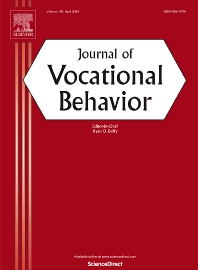Journals in Human resources management
Journals in Human resources management
Journal of Vocational Behavior
The Journal of Vocational Behavior publishes original empirical and theoretical articles that contribute novel insights to the fields of career choice, career development, and work adjustment across the lifespan and which are also valuable for applications in counseling and career development programs in colleges and universities, business and industry, government, and the military.The Journal primarily focuses on investigations of individual decision-making about work and careers rather than studies of employer or organizational-level variables. Example topics include initial career choices (e.g., choice of major, initial choice of work or organization, organizational attraction), the development of a career, work transitions, work-family management, work adjustment and attitudes within the workplace (such as work commitment, multiple role management, turnover).Editors will consider manuscripts that make significant contributions to the literature in the following areas: Studies of individuals' career and work-related choices examining topics such as: • Theories of career choice; occupational interests and their measurement • The inter-relation of abilities, needs, values, and personality • Occupational aspirations and the vocational decision-making process • Career adaptability; vocational development processes and stages • The effects of culture, demographic variables, and experiential factors on vocational choice • Career exploration • Job search • Organizational socialization. Stud... of work decisions and adjustment within the workplace, investigating topics such as: • Job performance and satisfaction • Career success; • Theories of work adjustment • Adult vocational development and career patterns • Organizational commitment and job involvement • Multiple-role management and the work-family interface • Work-role salience • Culture, demographic variables, and experiential factors on workplace decisions • Work-leisure relations • Midlife career change • Occupational re-entry and transition from work to retirement. • Individual job characteristics and job design. • Work-related stress and well-being. The journal also publishes research on career interventions; mentoring; and psychometric research that reports the construction and initial validation of new inventories as well as studies that evaluate the reliability and validity of instruments that measure career related constructs. Please note: the Journal does not publish research on organization-, team-, or group-level variables nor does it publish studies on vocational education.- ISSN: 0001-8791

Journal of Behavioral and Experimental Economics
formerly the Journal of Socio-EconomicsThe Journal of Behavioral and Experimental Economics welcomes submissions that deal with various economic topics but also involve issues that are related to other social sciences, especially psychology, or use experimental methods of inquiry. Thus, contributions in behavioral economics, experimental economics, economic psychology, and judgment and decision making are especially welcome. The journal is open to different research methodologies, as long as they are relevant to the topic and employed rigorously. Possible methodologies include, for example, experiments, surveys, empirical work, theoretical models, meta-analyses, case studies, and simulation-based analyses. Literature reviews that integrate findings from many studies are also welcome, but they should synthesize the literature in a useful manner and provide substantial contribution beyond what the reader could get by simply reading the abstracts of the cited papers. In empirical work, it is important that the results are not only statistically significant but also economically significant. A high contribution-to-leng... ratio is expected from published articles and therefore papers should not be unnecessarily long, and short articles are welcome. Articles should be written in a manner that is intelligible to our generalist readership. Book reviews are generally solicited but occasionally unsolicited reviews will also be published. Contact the Book Review Editor for related inquiries.- ISSN: 2214-8043
